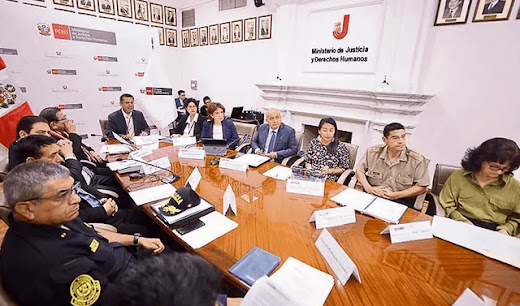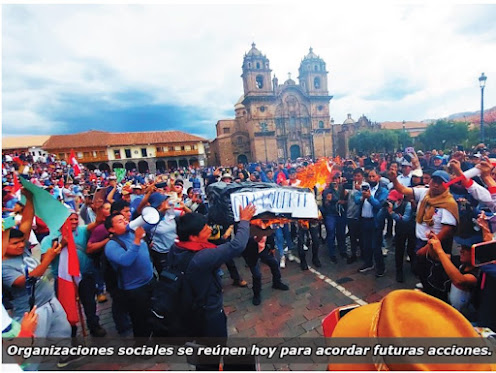Silences and half-truths in Peru's session on human rights with the United Nations (La República [Spanish] - 3/4/2023)
Silences and half-truths in Peru's session on human rights with the United Nations (Spanish)
President Dina Boluarte's regime avoids giving clear answers about the Peruvian Army's role in the Ayacucho Massacre. 'They also did not provide requested information on the police raids in San Marcos and the Campesino Confederation.
Evasive: Justice Minister José Tello was only there at the beginning and then withdrew from the virtual meeting without giving clear answers to the UN (photo diffusion)
Wilber Huacasi - La República
Peruvian authorities and officials yesterday avoided responding clearly to the Committe of the United Nations High Commissioner on Human Rights on specific issues related to the excessive use of force and crimes committed against civilians within the State of Emergency decreed by Dina Boluarte's regime. There were only generalities, silences, and half-truths.
All this occurred during the first of the three sessions carried out by the UN Committee in Geneva. The Peruvian representation participated virtually from Lima.
During this first meeting, Hernán Quezada, the Commissioner representing Chile, asked direct questions about the use of public force during the social protests.
A specific question was about the role of the Armed Forces in the State of Emergency. Despite the relevance of the query, it was only answered by an official from the Ministry of Defense.
At the beginning of the meeting, Minister of Justice José Tello had participated, but he later chose to go to the Palace and did not attend the important session during the round of questions.
Peruvian Army Colonel Gerber Gary Rubio Álvarez, director of Policies and Strategies of the Ministry of Defense, only referred to Legislative Decree 1095, which regulates the use of force in national territory.
The military official maintained that this Decree "has allowed military personnel of the Armed Forces to act correctly for their participation in the maintenance and restoration of internal order (...), in unrestricted respect for human rights."
By then, the Chilean Commissioner had already mentioned the December 15, 2022, deaths in Ayacucho as a product of the repression carried out by military personnel.
Jenni Dador, Executive Secretary of the National Human Rights Coordinator (CNDDHH), who was in Geneva, rejected such this version in a telephone interview with La República.
“How can they say there was unrestricted compliance with human rights if we all know, from what we saw and from the autopsies, is that there was a pattern of extrajudicial executions, and that a prohibited instrument of war was used against people who were not even participating in the demonstrations”, protested Dador.
Consulted on the subject, Ruth Luque Ibarra, the Congress Member from Cusco who accompanied several of the injured in the protests, also rejected the version that the Army was trying to give.
"The high number of deaths and injuries accounts for the impact and forcefulness of the excessive violence that was carried out by the Police and the Armed Forces," Luque Ibarra said.
The Peruvian National Police's omission
Another official who participated in yesterday's session was the head of the PNP's Lima Police Region, General Víctor Zanabria Angulo. In his presentation, the General spoke of generalities about compliance with international standards in the actions of the PNP.
At another time, General Zanabria Angul referred to the commanders and the possible political responsibility of Peru's Interior Minister Vicente Romero, on the subject he pointed out that there are "two commissions established in the Congress of the Republic."
The truth is that Congress has been delaying the operation of this type of investigative commission. A reconsideration was voted in Congress on Thursday and to date there is not even a commission installed.
General Zanabria avoided responding to the entry of the PNP into the facilities of the Universidad Nacional Mayor de San Marcos and the headquarters of the Peasant Confederation of Peru.
This generated noticeable discomfort for the Commissioner for Chile, Hernán Quezada, who insisted that they provide him with concrete information.
And Commissioner Quezada was not the only one who was upset. Then the session also covered other general policies of the Peruvian government on human rights.
"We have not received very specific information on some of my questions," said Commissioner for Portugal José Santos. "I have not been given any type of information; therefore, it is not possible for me to ask any type of follow-up question." Commissioner for Spain Carlos Gómez also repeated this concern.
The UN Committee session will continue in Geneva on March 6 and 7.
Tags: #ONU #Peru #DDHH #AyacuchoMassacre #Protests




Comments
Post a Comment